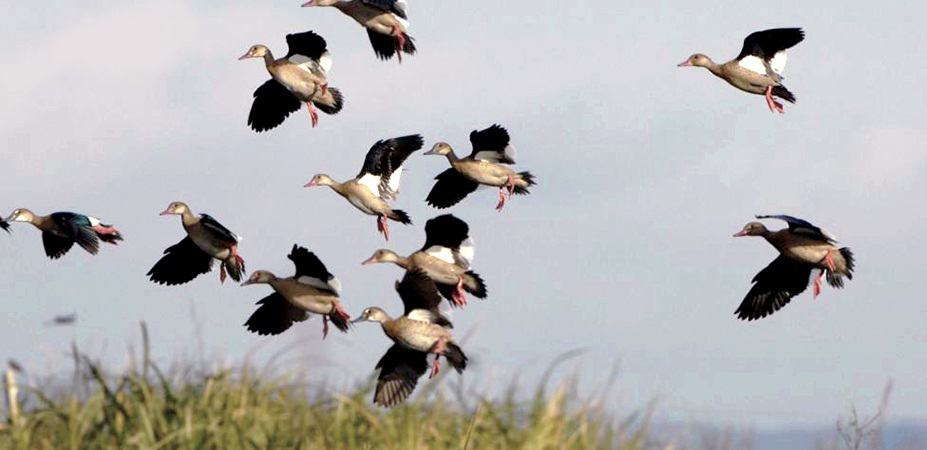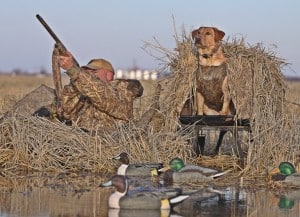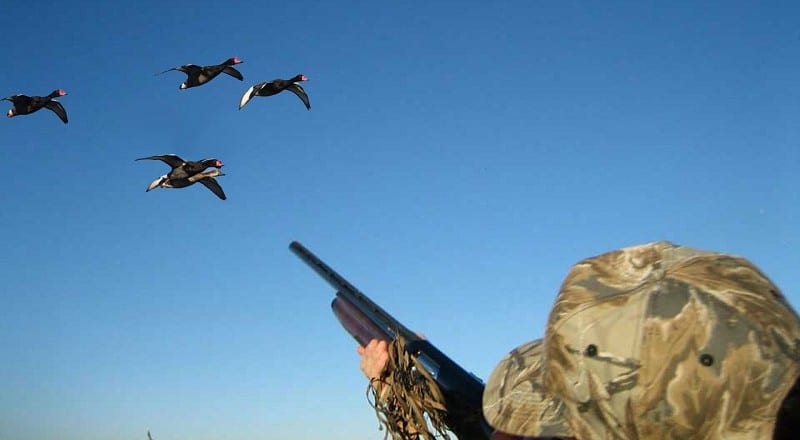Duck hunting is a skill that can take years to master. Shooting at a non-moving target is one thing, but it’s much harder to hit something that can fly in any direction (especially if you’re on water). That’s why we decided to help the duck hunting community out with this comprehensive list of all the duck hunting tips you’ll ever need. Whether you’re preparing for your first outing or have decades of duck hunting notches in your belt, you should be able to increase your chances of success after reviewing these tips.
For your convenience, we’ve broken these duck hunting tips down into nine categories: off-season preparation, scouting duck hunting locations, pre-hunt preparation, decoys, calls, valuable duck hunting assets, mid-hunt tactics, shooting tips and tricks, and documentation.

Off-Season Preparation
- Keep all of your duck hunting gear clean and organized. Few things are more frustrating than dealing with tangled cords, damaged decoys or a dead boat battery just before the duck hunting season starts.
- Work out with your dog regularly during the off-season to keep it sharp and healthy.
- Attend a shooting school to hone your skills and to help you avoid getting rusty.
Scouting Duck Hunting Locations
- Use Google Maps, your own experience and advice from fellow hunters to pick your prime spots instead of just “winging it”.
- Decide if you’re going to hunt from your boat, the edge of the water or in a field. Try each and see what works for you, and also make the decision based on the specific game you’re after.
- In-boat duck hunting is great, but consider getting away from the boat every now and then. It can be slightly more uncomfortable but you can take more stable shots and remain concealed easier.
Pre-Hunt Preparation
- The smell of your clothing doesn’t matter as much when duck hunting as it does when hunting large mammals, but you still want to make sure you’re covered from head to toe in colors that won’t give you away.
- Eliminate any shiny spots on your boat or supplies, as these can be a dead giveaway to waterfowl that something isn’t right.
- Make sure your ammunition matches your gun and choke by testing the spray patterns at 10, 20 and 40 yards.
- Prepare an emergency medical kit and have a way to reach the outside world in case of accidents.
Decoys
- Invest in decoys to draw flocks to you. If you can’t afford full-body decoys, buy shell decoys and attach weights to the bottom. You can also attach strips of orange trail marker tape to the bottom of your decoys to simulate legs.
- Create decoy spreads by attaching multiple duck hunting decoys together in a group. This is exponentially more effective than planting a single decoy at a time.
- Match your decoys to the type of duck you’re hunting. Otherwise you’ll just be wasting time and money. You can also plant a goose decoy to attract prey when duck hunting in a field.
Calls
 Become familiar with the multiple kinds of duck calls and use the one that’s appropriate for the current outing.
Become familiar with the multiple kinds of duck calls and use the one that’s appropriate for the current outing.- Many rookie duck hunters make the mistake of overcalling. You can use calls to attract ducks, but if they are already headed in your direction just wait for them to come within range.
Valuable Duck-Hunting Assets
- Buy or build a duck blind to conceal yourself from potential targets.
- Attach jerk cords to your decoy spreads to add the effect of natural movement.
- Line your boat with camo cords, spaced about one foot apart, and secure them with screws, nails or rivets. Weave natural, local vegetation through the cords to help conceal your boat’s natural shape and colors.
- Use shotgun choke tubes to quickly and easily change the pattern and range of your shots.
Mid-Hunt Tactics
- Hunt when others don’t to give yourself the best chance to get the waterfowl you want. Arrive early, stay late, and be flexible about your location and the weather in which you’re willing to hunt.
- Create a fake water hole when field hunting to lure in prey. You can do this by finding a small depression in the ground and covering it with an irregularly-shaped piece of plastic. Place some brush and a few reeds around the edges. Add a couple of decoys and some water to make the spot look even more attractive.
- Ducks tend to stir up the waters when they are feeding, creating a muddy look. Stomp around in the area where your decoy spread is planted to mimic this effect because decoys sitting in clear waters will look suspicious to passing flocks.
- If you know the location of a roost, avoid hunting directly from the roost. You can set up nearby, but attacking the roost itself for a fast kill will cause the ducks to relocate, leaving you with nothing.
Shooting Tips & Tricks
- If there are multiple hunters in your party, assign shooting positions. This is not only for safety purposes; it allows everyone to have a fair chance at decoying flock.
- Be patient. Trigger-happy duck hunters can scare a flock away before a good, clean shot is ever available.
- Focus on one bird at a time. Many hunters go for the easiest shot, but if you focus on the trailing or highest bird you’ll be in a good position to get other birds with your next couple of shots as they break away from the flock.
- Lead your aim slightly more than you think is necessary and don’t forget to keep swinging as you pull the trigger.
Documentation
Keep a journal detailing the flocks you encountered, the date and time, the weather, the tools you used, etc. Review the journal before your next hunt to determine what worked and what didn’t. This will increase your chances of success the next time you go duck hunting and it’s much more valuable than trying to rely on memory alone.
Conclusion
How many of these duck hunting tips are new to you? Which ones have worked for you in the past? Do you have any other ideas for duck hunting success that we can add to this list? If so, we’d love to hear from you. Happy hunting!

Kylie Dotts says
I like the advice you give about making sure you’re using the appropriate calls for the current outing you’re going on. My husband and brothers have recently gotten into duck hunting and are starting to go out more and more often so I’m going to make sure they know to use the correct duck calls. It would probably be a good idea to look into a guided duck hunt so they can get more experience and learn from an expert.